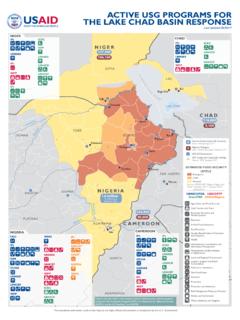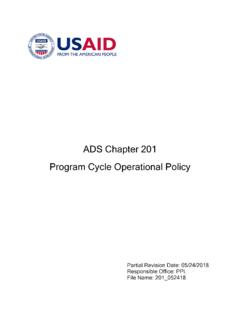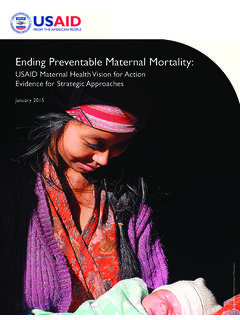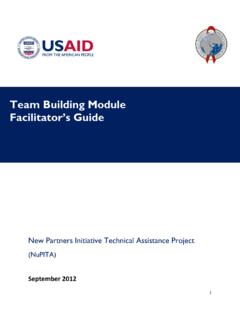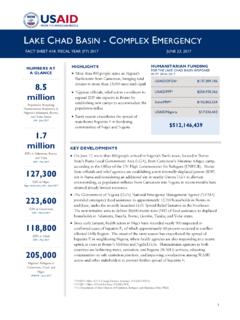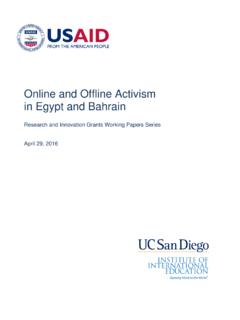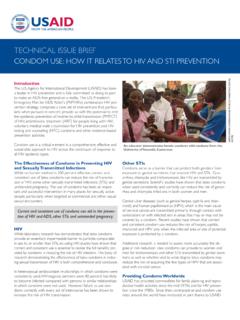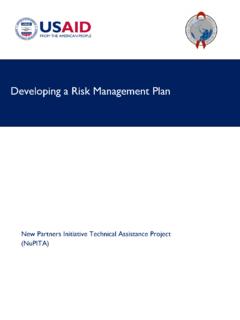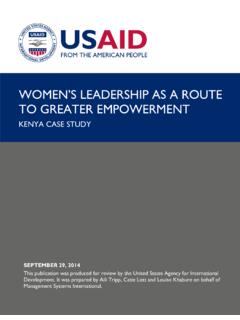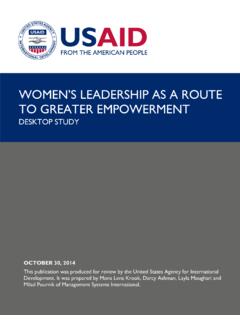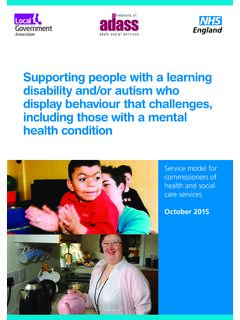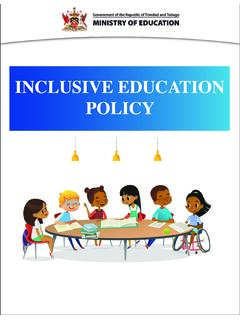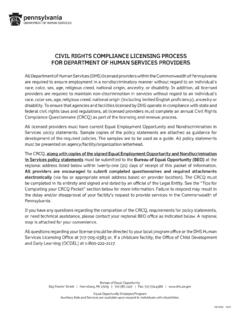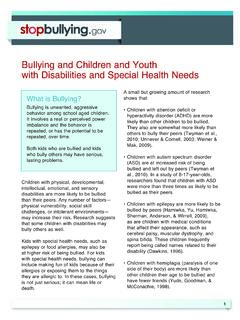Transcription of BEING LGBT IN ASIA: THE PHILIPPINES COUNTRY REPORT
1 BEING LGBT IN ASIA: THE PHILIPPINES COUNTRY REPORTA Participatory Review and Analysis ofthe Legal and Social Environment forLesbian, Gay, Bisexual and Transgender (LGBT)Individuals and Civil SocietyProposed citation:UNDP, USAID (2014). BEING LGBT in Asia: The PHILIPPINES COUNTRY REPORT . REPORT was technically reviewed by UNDP and USAID as part of the BEING LGBT in Asia initiative. It is based on the observations of the author(s) of the Philippine National LGBT Community Dialogue held in Manila in June 2013, conversations with participants and a desk review of published literature. The views and opinions in this REPORT do not necessarily reflect official policy positions of the United Nations Development Programme or the United States Agency for International Development. UNDP partners with people at all levels of society to help build nations that can withstand crisis, and drive and sustain the kind of growth that improves the quality of life for everyone.
2 On the ground in more than 170 countries and territories, we offer global perspective and local insight to help empower lives and build resilient UNDP 2014 United Nations Development ProgrammeUNDP Asia-Pacific Regional CentreUnited Nations Service Building, 3rd FloorRajdamnern Nok Avenue, Bangkok 10200, ThailandEmail: +66 (0)2 304-9100 Fax: +66 (0)2 280-2700 Web: : Safir Soeparna/Ian LGBT IN ASIA: THE PHILIPPINES COUNTRY REPORTA Participatory Review and Analysis of the Legal and Social Environment for Lesbian, Gay, Bisexual and Transgender (LGBT) Individuals and Civil Society2 | BEING LGBT IN ASIA: THE PHILIPPINES COUNTRY REPORTCONTENTSACKNOWLEDGEMENTS 3 ACRONYMS 4 EXECUTIVE SUMMARY 7 INTRODUCTION 14 L AW S 21 OVERVIEW OF LGBT
3 rights IN THE PHILIPPINES 21 POLICIES 24 CULTURAL AND SOCIAL ATTITUDES 25 RELIGION 26 EDUCATION 29 PROTECTION OF THE rights OF LGBT PEOPLE.
4 THE PHILIPPINES EXPERIENCE 29 HEALTH 32 EMPLOYMENT 35 FAMILY AFFAIRS 38 RELIGION 42 MEDIA 43 POLITICS 47 LGBT ORGANIZING AND CAPACITY IN THE PHILIPPINES 50 STRENGTHS 55 GAPS AND LIMITATIONS
5 58 BIBLIOGRAPHY 61 ANNEX 1: LIST OF PARTICIPATING LGBT ORGANIZATIONS 73 ANNEX 2: INDIGENOUS LGBT TERMS IN THE PHILIPPINES 77 ACKNOWLEDGEMENTSThis REPORT documents the presentations and discussions from the Philippine National LGBT Community Dialogue held in Manila on 29 30 June 2013 at the University of the PHILIPPINES , Diliman in Quezon City. Additional information was gained from interviews with Dialogue participants and a desk review of published literature. Please note that due to constant changes in LGBT community advocacy and politics, there may be recent developments that have not have been included in this REPORT at the time of organizers would like to gratefully acknowledge all the participants from Luzon, Visayas and Mindanao for their participation during the Dialogue and for providing valuable input for the REPORT .
6 A list of organizations and participants is included in Annex 1 of this thanks to the following people for providing key reference materials and guidance during the development of the Dialogue REPORT : Professor Michael L. Tan, , Chancellor, University of the PHILIPPINES , Diliman and a BEING LGBT in Asia Technical Advisor; Eric Manalastas, Assistant Professor at the Department of Psychology of the University of the PHILIPPINES , Diliman; Michelle Jhoie Ferraris, President of United Gay Power Movement of Angeles City; Jonas Bagas, Executive Director of TLF Share; Magdalena Robinson, President of Transgender Colors Inc. of Cebu City; Em Ang, Bacolod City Councilor; Anne Lim, Executive Director of GALANG PHILIPPINES Inc.; Ging Cristobal of the International Gay and Lesbian human rights Commission (IGLHRC) and a BEING LGBT in Asia Technical Advisor; Brigite Salvatore, a Muslim transgender woman who was behind the documentary film Model Citizen ; Nicky Castillo, Managing Director and Angie Umbac, President of The Rainbow rights Project; Henry Perey, Founder and President of Pinoy Deaf Rainbow Inc.
7 ; and the Health Action Information Network (HAIN). Lastly, credit also goes to Outrage Magazine (Michael David C. Tan, editor-in-chief, and John Ryan N. Mendoza, managing editor). This online magazine provided many of the case studies presented in this David C. Tan is the author of this REPORT and was the Dialogue s comments and input on drafts of the REPORT were provided by Thomas White, Deputy Director, Governance and Vulnerable Populations Office, USAID Regional Development Mission Asia (RDMA), Catherine Hamlin, Governance Officer, USAID PHILIPPINES , and Ajit Joshi and Vy Lam, USAID Washington, ; and Edmund Settle, Policy Advisor and Saurav Jung Thapa, LGBT and human rights Technical Officer from the UNDP Asia-Pacific Regional Centre. Andy Quan was the REPORT editor. Finally, the Dialogue partners would like to recognize the outstanding contribution of Philip Castro, Programme Officer; Fe Cabral, Programme Associate; and Christopher M.
8 Reyes, LGBT human rights Officer from UNDP PHILIPPINES ; and Li Zhou, LGBT and human rights Technical Officer, and Rashima Kwatra, LGBT human rights Officer from UNDP Asia-Pacific Regional Centre in Bangkok for ensuring the Dialogue was a success. Our thanks and gratitude also to Percival Cenda a who facilitated the Philippine National LGBT Community Dialogue and national REPORT was supported by UNDP and USAID through the regional BEING LGBT in Asia initiative. Covering eight countries Cambodia, China, Indonesia, Mongolia, Nepal, the PHILIPPINES , Thailand and Viet Nam this joint learning initiative aims to understand the legal, political and social challenges faced by LGBT people, relevant laws and policies, and their access to justice and health services. The initiative will also review the needs of LGBT organizations, the space they operate in, their capacity to engage on human rights and policy dialogues, and the role of new technologies in supporting LGBT advocacy.
9 BEING LGBT IN ASIA: THE PHILIPPINES COUNTRY REPORT | 3 4 | BEING LGBT IN ASIA: THE PHILIPPINES COUNTRY REPORT4 | BEING LGBT IN ASIA: THE PHILIPPINES COUNTRY REPORTACWC ASEAN Commission on the Protection and Promotion of the rights of Women and ChildrenAIDS Acquired Immune Deficiency SyndromeADB Anti-Discrimination BillADO Anti-Discrimination OrdinanceAICHR ASEAN Intergovernmental Commission on human RightsAO Administrative OrderARV Antiretroviral TherapyASEAN Association of South East Asian NationsBuB Bottom-up BudgetingCAT Convention Against TortureCBCP Catholic Bishops Conference of the PhilippinesCBO Community-Based OrganizationCEDAW Convention on the Elimination of All Forms of Discrimination Against WomenCERD Convention on the Elimination of all Forms of Racial DiscriminationCHED Commission on Higher EducationCHR Commission on human RightsCOMELEC Commission on ElectionsCRPD Convention on the rights of Persons with DisabilitiesCSC Civil Service CommissionCSO Civil Society OrganizationDepEd Department of
10 EducationDILG Department of Interior and Local GovernmentDOH Department of HealthDOLE Department of Labor and EmploymentDSWD Department of Social Welfare and DevelopmentDTI Philippine Department of Trade and Industry (DTI)FBO Faith-based OrganizationFTM Female-to-Male TransgenderGAD Gender and DevelopmentGALANG Gay and Lesbian Activist Network for Gender Equality Government OrganizationHAC HIV/AIDS CommitteeHB House BillHIV human Immunodeficiency VirusHR human resource(s)HRT Hormone Replacement TherapyICCPR International Covenant on Civil and Political rights ICESCR International Covenant on Economic, Social and Cultural RightsACRONYMSICRMW International Convention on the Protection of the rights of All Migrant Workers and Members of Their FamiliesIDAHO International Day Against HomophobiaIDU Injecting Drug UserIEC Information, Education and CommunicationIGLHRC International Gay and Lesbian human rights CommissionIRR Implementing rules and regulationsKAP Key Affected PopulationLAC Local AIDS CouncilLGBT Lesbian, Gay, Bisexual and TransgenderLGBTS Lesbian, Gay, Bisexual.
